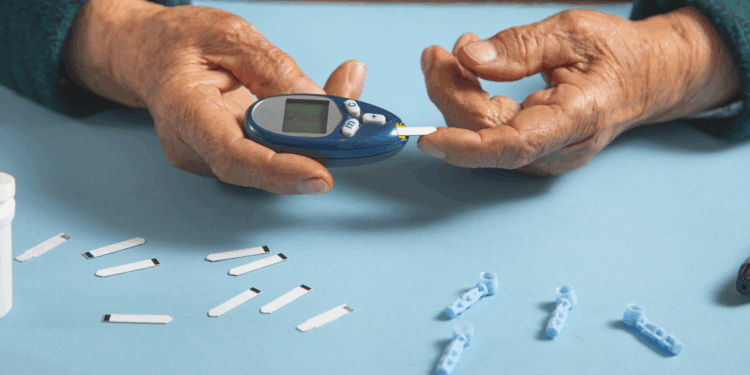Diabetes has become one of the most common health concerns among older adults today. Many elderly people discover they have high blood sugar levels for the first time in their sixties, often during a routine health check. While diabetes can occur at any age, its impact tends to be more complex after 60. The body’s metabolism, muscle strength, and insulin response all change with time, making awareness and timely care more important than ever.
With proper understanding and regular management, diabetes need not interfere with an active, fulfilling lifestyle.
Why Diabetes Is Different After 60
Diabetes develops when the body either cannot use insulin properly or fails to produce enough of it, resulting in elevated blood glucose levels. After the age of 60, several natural changes make blood sugar management more challenging. Metabolism slows down, meaning the body processes food and energy at a different pace. At the same time, muscle mass gradually decreases, and since muscles help the body use glucose effectively, this decline can lead to higher sugar levels even without dietary changes.

Join Now >
Other health conditions, such as hypertension, arthritis, or cholesterol imbalance, often appear alongside diabetes, adding layers of complexity. Some medications prescribed for unrelated health problems can also influence glucose levels.
Another challenge is that diabetes symptoms can be subtle in older adults. Fatigue, frequent urination, or mild dizziness may be mistaken for normal signs of ageing. This is why regular blood sugar screening after 60 is highly recommended, even for those who feel healthy.
Recognising the Early Signs of Diabetes in Seniors
Diabetes in later life often progresses quietly. Common indicators include tiredness, increased thirst, frequent urination, or blurred vision. In some cases, weight loss without a clear reason, slow-healing wounds, or recurring infections may also appear.
Because these signs overlap with other age-related concerns, they are easy to overlook. However, recognising them early and consulting a doctor can make management much simpler. Even mild changes in appetite, energy, or skin health can offer valuable clues. Regular fasting and post-meal sugar tests help identify fluctuations before they become serious.
Managing Diabetes Effectively in After 60
Diabetes management after 60 focuses on more than just controlling blood sugar; it’s about maintaining overall well-being. A thoughtful approach to diet, exercise, medication, and emotional balance can make all the difference.
- Balanced Diet:
A nutritious and consistent meal plan supports steady glucose levels. Choose fibre-rich foods like whole grains, vegetables, pulses, and fruits in moderation. Avoid refined carbohydrates, sugary snacks, and heavily processed foods. Staying hydrated, especially during hot weather, helps regulate body function and energy levels. - Physical Activity:
Gentle movement remains one of the most effective ways to control diabetes. Regular walks, yoga, or light chair exercises improve insulin use and circulation. Even 20–30 minutes of activity most days of the week can reduce blood sugar and enhance mood. Elders with joint or heart issues should consult a doctor before starting any exercise plan, but most forms of moderate movement are safe and beneficial. - Medication and Monitoring:
Following prescribed medication on time is crucial. Some seniors may require insulin, while others may manage with tablets and lifestyle adjustments. Setting reminders or using pill organisers ensures consistency. Home glucose monitors make it easier to track readings, while routine doctor visits allow for fine-tuning of doses when needed. - Regular Health Check-ups:
Comprehensive care includes more than just sugar tests. Regular eye exams, foot checks, kidney screenings, and heart assessments help detect complications early. Foot care deserves special attention since nerve sensitivity and wound healing tend to slow with age. - Emotional and Social Support:
Chronic conditions like diabetes can affect mental well-being. Feelings of frustration, worry, or fatigue are common but manageable with the right support. Sharing experiences with peers, joining diabetes education sessions, or engaging in community activities can foster motivation and positivity. Family encouragement also plays a vital role in helping seniors stay on track.
Common Complications and How to Prevent Them
Diabetes can affect multiple organs if not properly controlled. The most common complications involve the heart, kidneys, eyes, and nerves. Numbness in the feet, poor circulation, or vision changes may signal early warning signs.
However, prevention is absolutely possible. Keeping blood sugar, blood pressure, and cholesterol within healthy ranges reduces long-term risk. Timely medication, a balanced diet, and regular follow-ups form the best protection against complications. Preventive care ensures that small problems are detected early, before they become major health concerns.
Living Positively with Diabetes after 60
A diagnosis after 60 should not be seen as a setback; it can serve as a reminder to adopt habits that support lifelong health. Managing diabetes is not about restriction but about finding the right balance in food, activity, and rest. Many seniors find that healthier routines improve their energy and overall quality of life.
Staying informed through workshops, diabetes educators, or reliable online health platforms helps build confidence. Simple habits like consistent meal timings, staying active, and maintaining social connections can make management smoother and more rewarding.
Conclusion
Understanding how diabetes behaves after 60 empowers older adults to take control of their health with clarity and confidence. With regular monitoring, sensible routines, and medical guidance, diabetes can be managed effectively while maintaining independence and vitality.
The goal is steadiness, awareness, and balance. Life after 60 can remain healthy, active, and deeply fulfilling with the right care and mindset.
Our expert team offers complete support for diabetes management and healthy ageing, from regular health monitoring and nutrition guidance to personalised care plans. Connect with Samarth today and start your journey towards balanced health, independence, and peace of mind.






